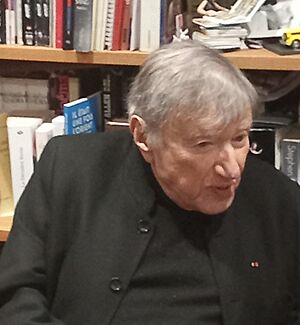Étienne-Émile Baulieu facts for kids
Quick facts for kids
Étienne-Émile Baulieu
|
|
|---|---|

Baulieu in 2023
|
|
| Born | 12 December 1926 |
| Died | 30 May 2025 (aged 98) Paris, France
|
| Nationality | French |
| Known for | RU-486 DHEA Neurosteroids |
| Scientific career | |
| Fields | Endocrinology |
| Institutions | INSERM |
Étienne-Émile Baulieu (born December 12, 1926 – died May 30, 2025) was a French biochemist and endocrinologist. He was famous for his studies on steroid hormones. These hormones play a big role in how our bodies grow, develop, and age. He was known for his work on a medicine called RU486 (Mifepristone). Baulieu also researched if a hormone called dehydroepiandrosterone (DHEA) could help people live longer and healthier lives.
Contents
Early Life and Education
Étienne-Émile Baulieu was born Émile Blum in Strasbourg, France, on December 12, 1926. His father was a doctor who specialized in diabetes. During World War II, his family had to move, and he changed his name to Baulieu. He also joined the French resistance movement.
After the war, he studied at the Faculté de Médecine de Paris. He became a doctor in 1955. He continued his studies in the field of steroid hormones. He earned his PhD in 1963 from universities in Paris.
Career and Research Discoveries
In 1963, Baulieu became a research director at INSERM, a French research institute. Later, in 1970, he became a professor of Biochemistry at the University of Paris-South. He was also part of France's "Ethical Advisory Committee" for science and health.
Baulieu was very interested in how our bodies work as we get older. He was involved with the "Institute of Longevity and Aging." In 2008, he started the Institut Baulieu. This institute focuses on studying and treating brain diseases. It also researches ways to help people stay healthy as they age. He served as president of the French Academy of Sciences. He was also a member of the United States' National Academy of Sciences.
Understanding Hormones: DHEA
Baulieu had a long-standing interest in dehydroepiandrosterone (DHEA). In 1960, he showed that DHEA is a main hormone made by the adrenal glands. He also described how the body uses and changes it. His work helped us understand how estrogens are made during pregnancy. This led to the idea of DHEA being a "prohormone," meaning it can be changed into other hormones in the body.
He also studied how hormones affect reproduction and pregnancy. He was a pioneer in describing how cells receive hormone signals. He identified important parts of cells, like heat shock proteins, that help with this process. He specifically worked on the progesterone receptor and androgen receptor.
Neurosteroids: Hormones in the Brain
Baulieu made an exciting discovery: DHEA and another hormone called pregnenolone are made right inside the brain. In 1981, he gave these brain-made hormones the name "neurosteroids."
These neurosteroids are active in the nervous system. They help repair nerve coverings called myelin. They also protect the nervous system and can even improve memory. Baulieu thought these agents could help keep the brain working well as people get older. He suggested that DHEA might help older people with memory loss or feeling sad. He conducted studies to see if DHEA could benefit older adults.
RU486: A Medical Breakthrough
Baulieu is widely recognized for his work on RU486 (Mifepristone). He had identified the progesterone receptor in cells. He suggested to a company to change the progesterone molecule to create an "anti-progesterone." This led to the creation of RU486 in 1980.
Baulieu studied how this medicine works. It acts as an anti-progesterone steroid. It can help regulate early pregnancy, especially when used with another medicine called misoprostol. RU486 also has other potential uses. It might help treat conditions like breast cancer, brain cancer, endometriosis, diabetes, and high blood pressure. He also found that it can block the effects of cortisol, which might be useful for managing depression or Cushing's syndrome.
Research on Longevity
Baulieu became very interested in what he called the "longevity revolution." This refers to the fact that people are living longer lives. He explored how hormonal treatments, like DHEA, could help improve well-being in old age. The "Institute Baulieu," which he started in 2008, focuses on finding ways to help older people stay independent and healthy.
Death
Étienne-Émile Baulieu passed away at his home in Paris on May 30, 2025. He was 98 years old.
Honours and Awards
- 1967 Chevalier of the Ordre national du Mérite
- 1982 French Academy of Sciences, President, 2003–04
- 1989 Albert Lasker Award for Clinical Medical Research
- 1990 National Academy of Sciences
- 1990 Grand Officer of the Légion d'honneur
- 1990 Golden Plate Award of the American Academy of Achievement
- 2002 French Academy of Medicine
- 2023, Grand Cross of the Legion of Honor
See also
 In Spanish: Étienne-Émile Baulieu para niños
In Spanish: Étienne-Émile Baulieu para niños
 | Shirley Ann Jackson |
 | Garett Morgan |
 | J. Ernest Wilkins Jr. |
 | Elijah McCoy |

